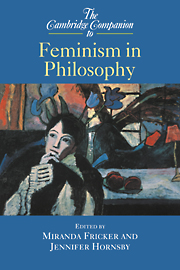Book contents
- Frontmatter
- Introduction
- 1 Feminism in ancient philosophy
- 2 Feminism in philosophy of mind
- 3 Feminism in philosophy of mind
- 4 Feminism and psychoanalysis
- 5 Feminism in philosophy of language
- 6 Feminism in metaphysics
- 7 Feminism in epistemology
- 8 Feminism in epistemology
- 9 Feminism in philosophy of science
- 10 Feminism in political philosophy
- 11 Feminism in ethics
- 12 Feminism in ethics
- 13 Feminism in history of philosophy
- Further reading
- Index
2 - Feminism in philosophy of mind
The question of personal identity
Published online by Cambridge University Press: 28 May 2006
- Frontmatter
- Introduction
- 1 Feminism in ancient philosophy
- 2 Feminism in philosophy of mind
- 3 Feminism in philosophy of mind
- 4 Feminism and psychoanalysis
- 5 Feminism in philosophy of language
- 6 Feminism in metaphysics
- 7 Feminism in epistemology
- 8 Feminism in epistemology
- 9 Feminism in philosophy of science
- 10 Feminism in political philosophy
- 11 Feminism in ethics
- 12 Feminism in ethics
- 13 Feminism in history of philosophy
- Further reading
- Index
Summary
Introduction
A great deal of recent feminist work on philosophy of mind has been grounded on a central claim: that the key oppositions between body and mind, and between emotion and reason, are gendered. While the mind and its capacity to reason are associated with masculinity, the body, together with our emotional sensibilities, are associated with the feminine. Evidence for this view comes from at least two sources. First, overtly sexist philosophers have in the past claimed that women are by nature less capable reasoners than men and are more prone to ground their judgements on their emotional responses. These authors have been repeatedly opposed by defenders of women, whether male or female. Secondly, feminists have explored ways in which gendered oppositions are at work even in the writings of philosophers who do not explicitly differentiate the mental capacities of men and women or connect women with the bodily work of reproduction and domestic labour. By studying the metaphorical structures of philosophical texts, looking at what may appear to be digressions from the main line of argument, and paying attention to examples, they have identified persistent patterns of association running through the history of philosophy.
- Type
- Chapter
- Information
- The Cambridge Companion to Feminism in Philosophy , pp. 29 - 48Publisher: Cambridge University PressPrint publication year: 2000
- 11
- Cited by

